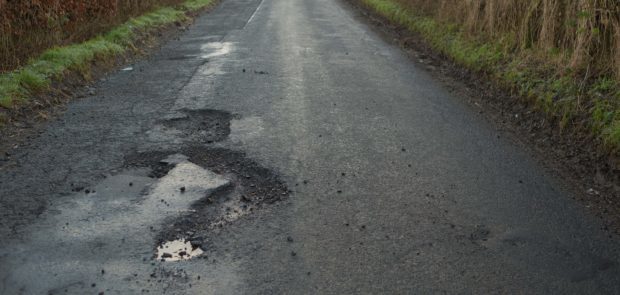An innovative project which could see recycled plastic used to fill potholes and repair roads could soon be trialled in Fife.
Potholes are a perennial problem across Scotland, but Fife Council has confirmed it is examining the possibility of using old plastic bags and bottles to resurface roads in the not-too-distant future.
The local authority has approached Carlisle-based company MacRebur, which has developed a bitumen-substitute called MR6, to explore the benefits of using the product.
Hopes are high the substance could go a long way to solving the nation’s pothole crisis.
The firm has been financially-backed by Sir Andy Murray and Virgin boss Sir Richard Branson in recent years, and Cumbria County Council carried out a successful £200,000 resurfacing scheme on the A7 in the Lake District.
Similar initiatives have been used elsewhere in Europe, and it seems it is only a matter of time before Fife gives it a go.
Derek Crowe, the Fife roads and transportation service’s senior manager, said: “We’re open to trialling innovative and sustainable road surfacing materials. However, at this time of economic restrictions the cost of the trial must be economic and competitive with traditional materials.
“Once any current cost issues can be overcome we will be happy to trial such innovative processes.”
Fellow service manager David Brown has also previously said it was an interesting concept which the local authority was keen to look at more closely.
“As a council, Fife has always been at the forefront of sustainability and we try to keep up to date with all the latest innovation which is coming forward,” he said.
“We have been taking a keen interest in the process of turning recycling plastic into potential road surface and have been in touch with MacRebur with a view to carrying out a trial in Fife.
“At the moment, we are researching technical aspects of the process and looking at potential sites where this could be done.”
Estimates last month suggested the cost of tackling Scotland’s pothole backlog stands at around £1.2 billion, and other avenues to help deal with the problem are being actively explored.
Laboratory tests showed that the MR6 filler is 60% stronger and 10 times longer lasting than normal asphalt.
The idea was born when MacRebur’s chief executive was working in Southern India with a charity helping people who work on landfill sites, and some of the waste plastics were put into potholes, petrol poured over them and the rubbish set alight until the plastics melted into the craters.
The notion has developed since, with a mix of waste plastics turned into pellets and added into the making of an enhanced asphalt road.
Inverkeithing and Dalgety Bay councillor Alice McGarry raised the idea with officers and admitted she would love to see how it could work here.
“It would be wonderful to use these materials,” she said. “The Netherlands have invested in this heavily but it may not be suitable for all countries.”
